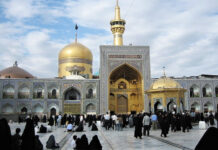In Pakistan and many other persecuted nations, blasphemy laws have served effectively as

a death sentence for Christian minorities. In addition to the obvious legal consequences of these discriminatory laws, extremists often take matters into their own hands to settle personal scores, incite violence, and target Christians and minority communities.
Not even the most vulnerable communities, whether the elderly or the mentally disabled, are safe from these hateful attacks.
On May 25, 2024, a large mob filled the streets of Mujahid colony in Gillwala, a predominantly Christian community in Sargodha, Pakistan. They descended on an elderly Christian man, Nazir Masih, based on rumors that he had burned pages of a Quran.
The mob also looted and burned a shoe shop owned by Masih’s son, Sultan Masih, and burned the family’s home, where Nazir, his two sons, and 10 other family members live.
Several videos of the attack circulated on social media. ICC obtained additional footage of the attack from sources in the area. One video shows Nazir lying still on the ground, his face bloodied as several men kick his lifeless body. Another shows Nazir sitting on the ground, covered in dust and blood, as the angry mob surrounds him.
Although Masih was transported to a local hospital, the damage was already done. Nine days after the mob attacked, Masih succumbed to his injuries.
In response to the attack, an ICC staffer expressed, “Islamic radicals are mercilessly beating the elderly on false blasphemy accusations. The existence of Pakistan’s blasphemy laws sends a message to Islamic radicals that this mob violence is justified. The laws are used as a weapon against Christians and allow this behavior to continue among Pakistan’s most vulnerable communities.”
Thankfully, the authorities have taken appropriate action to exact justice in the wake of this tragedy. Dozens of mob participants have been detained for their involvement in Masih’s death and police are investigating the blasphemy accusations leveled against him. The authorities have also placed several members of Masih’s family in protective custody.
The death of Masih is not only tragic, but also reflective of a much larger problem plaguing Pakistan’s minorities. Until greater action is taken to overturn these unjust laws, extremists will continue to misuse them and carry out similar, if not greater, acts of violence. — International Christian Concern






